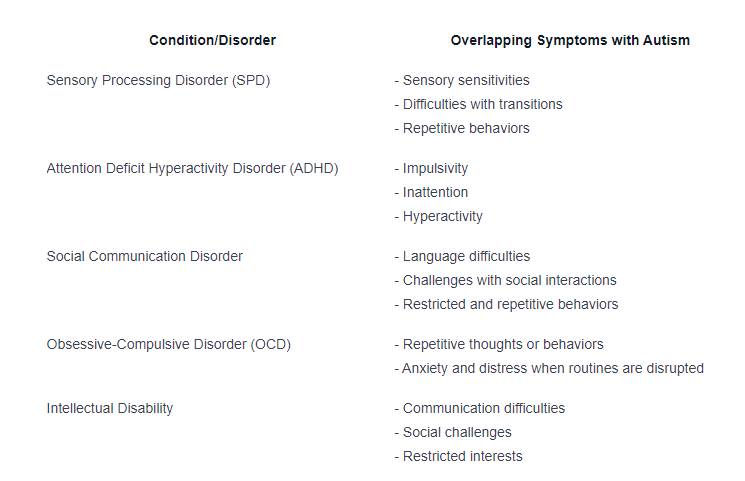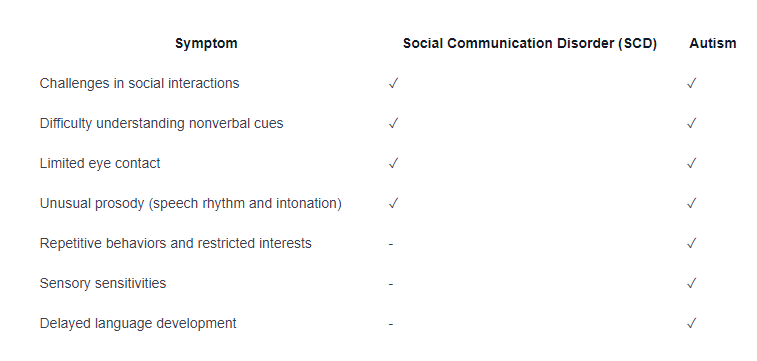Conditions and Disorders with Symptoms Similar to Autism
Unveiling conditions & disorders with autism-like symptoms. Discover the similarities, overlap, and distinct features in this insightful exploration.


Understanding Autism-like Symptoms
Autism is a complex neurodevelopmental disorder characterized by difficulties in social interaction and communication, as well as restricted and repetitive patterns of behavior. However, it's important to recognize that there are other conditions and disorders that can exhibit symptoms similar to autism. In this section, we will explore the characteristics of autism and discuss some of the similar symptoms observed in other conditions and disorders.
Characteristics of Autism
Autism is typically identified by a combination of social, communication, and behavioral challenges. Some of the common characteristics of autism include:
- Impairments in social interactions: Individuals with autism may have difficulty understanding and engaging in social interactions. They may struggle with nonverbal communication cues, have difficulty maintaining eye contact, and struggle to develop and maintain relationships.
- Communication difficulties: Language and communication difficulties are often observed in individuals with autism. This can range from delayed language development to a complete lack of speech. Some individuals may have difficulty with expressive language, while others may struggle with understanding and processing language.
- Restricted and repetitive behaviors: Individuals with autism often engage in repetitive behaviors or have specific interests that they focus on intensely. They may exhibit repetitive body movements, have strict adherence to routines, and show resistance to change.
Similar Symptoms in Other Conditions and Disorders
While autism has its distinct characteristics, there are other conditions and disorders that can present symptoms similar to those observed in individuals with autism. It's important to differentiate these conditions to ensure accurate identification and appropriate support. Here are some examples:

It's important to consult with healthcare professionals specializing in neurodevelopmental disorders to accurately diagnose and differentiate between these conditions. Each condition requires a tailored approach to treatment and support.
By understanding the characteristics of autism and recognizing the similar symptoms in other conditions and disorders, we can promote a better understanding of neurodiversity and provide appropriate support and resources for individuals who may exhibit autism-like symptoms.
Sensory Processing Disorder (SPD)
Sensory Processing Disorder (SPD) is a condition that affects how the brain processes and responds to sensory information from the environment. People with SPD may have difficulty organizing and responding to sensory stimuli, such as sound, touch, taste, and smell. While SPD is distinct from autism, there are overlapping symptoms that can sometimes lead to a misdiagnosis or confusion between the two conditions.
Overview of SPD
SPD is often characterized by atypical responses to sensory input. Individuals with SPD may experience sensory sensitivities, where certain stimuli that are typically tolerated by others can be overwhelming or distressing. On the other hand, individuals with SPD may also exhibit sensory-seeking behaviors, actively seeking out sensory stimulation to regulate their sensory experiences.
The symptoms of SPD can vary widely from person to person. Some individuals may be hypersensitive to sensory input, while others may be hyposensitive and have a reduced response to sensory stimuli. These sensory challenges can significantly impact daily functioning, including social interactions, communication, and overall quality of life.
Overlapping Symptoms with Autism
There are several symptoms that overlap between SPD and autism, which can sometimes make it difficult to distinguish between the two conditions. It is important to note that while there may be similarities, SPD and autism are separate diagnoses with distinct criteria. Here are some of the shared symptoms:

It's important to work with a healthcare professional who specializes in developmental disorders to properly assess and diagnose individuals exhibiting autism-like symptoms. By understanding the distinct features of each condition and identifying the specific challenges faced by individuals with SPD, appropriate interventions and support can be provided to help them thrive and reach their full potential.
-80.jpeg)
Attention Deficit Hyperactivity Disorder (ADHD)
Attention Deficit Hyperactivity Disorder (ADHD) is a neurodevelopmental disorder characterized by difficulties in maintaining attention, hyperactivity, and impulsivity. While ADHD and autism are distinct conditions, they can share certain overlapping symptoms, leading to potential confusion or misdiagnosis.
Understanding ADHD
ADHD is commonly diagnosed in childhood and can persist into adulthood. It is characterized by three main types: predominantly inattentive type, predominantly hyperactive-impulsive type, and combined type. Individuals with ADHD may struggle with staying focused, organizing tasks, completing assignments, and controlling impulsive behaviors.
The exact causes of ADHD are not fully understood, but it is believed to be influenced by a combination of genetic, environmental, and neurological factors. Treatment for ADHD often involves a combination of behavioral interventions, counseling, and medication, tailored to the individual's specific needs.
Shared Symptoms with Autism
While ADHD and autism are distinct conditions, they can exhibit similar symptoms, leading to potential confusion between the two. Some shared symptoms include:

It is important to note that the presence of these shared symptoms does not necessarily indicate the presence of both conditions. A comprehensive evaluation by a qualified healthcare professional is crucial for an accurate diagnosis.
Differentiating between ADHD and autism requires a careful assessment of the individual's overall symptom presentation, considering the specific diagnostic criteria for each condition. While there can be overlapping features, there are also distinct characteristics that help distinguish between the two.
Understanding the similarities and differences between ADHD and autism can facilitate accurate diagnosis and appropriate interventions for individuals who may present with symptoms resembling both conditions. Collaborative efforts between healthcare professionals, educators, and families are essential in providing comprehensive support and guidance for individuals with ADHD or autism-like symptoms.
Social Communication Disorder
Social Communication Disorder (SCD) is a condition characterized by difficulties in social interaction and communication skills. Individuals with SCD may struggle with verbal and nonverbal communication, making it challenging for them to effectively engage in social interactions. While SCD shares some similarities with autism, it is important to understand the distinctions between the two.
Social Communication Disorder Explained
SCD is a neurodevelopmental disorder that primarily affects communication and social interaction. Individuals with SCD may have difficulty understanding and using verbal and nonverbal cues, such as facial expressions, gestures, and tone of voice. They may find it challenging to initiate and maintain conversations, interpret social contexts, and understand social norms.
Unlike autism, individuals with SCD do not display the repetitive behaviors or restricted interests commonly associated with autism spectrum disorder. The focus of SCD is primarily on the communication difficulties that impact social interactions.
Symptoms That Resemble Autism
Although SCD and autism are distinct disorders, there are some overlapping symptoms that can make it difficult to differentiate between the two. Some symptoms commonly associated with autism, such as difficulties with social interaction and communication, can also be observed in individuals with SCD. However, it is important to note that individuals with SCD do not exhibit the full range of autism symptoms.
To further understand the similarities and differences between SCD and autism, let's compare some of the key symptoms:

By comparing the symptoms, it becomes evident that while some features of SCD and autism may overlap, there are distinct differences between the two. Understanding these differences is crucial for accurate diagnosis and appropriate intervention strategies.
It is important to consult with healthcare professionals, such as psychologists or developmental pediatricians, for a comprehensive evaluation and diagnosis when observing symptoms resembling autism. With proper assessment and diagnosis, individuals with SCD can receive targeted support and interventions tailored to their specific needs.
-80.jpeg)
Obsessive-Compulsive Disorder (OCD)
Obsessive-Compulsive Disorder (OCD) is a mental health condition characterized by recurring and intrusive thoughts (obsessions) and repetitive behaviors (compulsions) that individuals feel driven to perform. While OCD and autism are distinct disorders, they can share certain symptoms, leading to potential similarities in presentation.
OCD Overview
OCD is a complex disorder that affects people of all ages and backgrounds. Individuals with OCD experience intrusive thoughts, images, or urges that cause significant distress. These obsessions often revolve around themes such as cleanliness, symmetry, or safety. In response to these intrusive thoughts, individuals engage in repetitive behaviors or mental rituals to alleviate anxiety or prevent perceived harm.
The diagnostic criteria for OCD include the presence of obsessions, compulsions, or both, which consume a considerable amount of time and interfere with daily functioning. It's important to note that the symptoms of OCD can vary widely among individuals, both in terms of the nature of obsessions and compulsions and the severity of symptoms.
Commonalities in Symptoms with Autism
While OCD and autism are distinct disorders with different underlying causes, there are certain symptoms that can overlap between the two conditions. It is estimated that around 17% of individuals with autism also meet the criteria for OCD.

It's important to consult with a healthcare professional for an accurate diagnosis and appropriate treatment if you or someone you know is experiencing symptoms of OCD or autism. Proper evaluation and understanding of the underlying condition can help guide effective interventions and support.
Intellectual Disability
Individuals with intellectual disability may exhibit symptoms similar to those seen in autism. Understanding the definition of intellectual disability and recognizing the autism-like symptoms in individuals with this condition is important for accurate diagnosis and appropriate support.
Definition of Intellectual Disability
Intellectual disability, also known as intellectual developmental disorder, is a condition characterized by significant limitations in intellectual functioning and adaptive behavior. It typically manifests during the developmental period and affects an individual's cognitive abilities and everyday functioning.
To be diagnosed with intellectual disability, three criteria must be met:
- Intellectual functioning: The individual's intelligence quotient (IQ) falls below a certain cutoff point, usually around 70 or below, as measured by standardized intelligence tests.
- Adaptive behavior: The individual experiences significant challenges in meeting the demands of everyday life, such as communication, social interaction, self-care, and problem-solving skills.
- Onset during the developmental period: The limitations in intellectual functioning and adaptive behavior should be evident during childhood or adolescence.
Intellectual disability can range in severity, with different levels of support required based on the individual's needs.
Autism-like Symptoms in Individuals with Intellectual Disability
While autism and intellectual disability are distinct conditions, there can be an overlap in symptoms. Many individuals with intellectual disability may exhibit autism-like behaviors or characteristics. These include:
- Social communication difficulties: Individuals with intellectual disability may struggle with social interactions, including difficulties in understanding non-verbal cues, maintaining eye contact, and engaging in reciprocal conversation.
- Repetitive behaviors and restricted interests: Similar to autism, individuals with intellectual disability may engage in repetitive behaviors, have narrow or intense interests, and show resistance to changes in routines.
- Sensory sensitivities: Many individuals with intellectual disability may experience sensory sensitivities, such as being hypersensitive or hyposensitive to certain sounds, sights, textures, or tastes.
It's important to note that not all individuals with intellectual disability will exhibit autism-like symptoms, and not all individuals with autism will have intellectual disability. Each person's experience is unique, and a comprehensive assessment by a healthcare professional is necessary for accurate diagnosis and individualized support.
Understanding the connection between intellectual disability and autism-like symptoms can contribute to better support and intervention strategies for individuals with these conditions. By addressing their specific needs, we can enhance their overall well-being and quality of life.
Sources
https://www.webmd.com/brain/autism/autism-similar-conditions
https://www.abtaba.com/blog/conditions-and-disorders-with-symptoms-similar-to-autism
https://autism.org/related-disorders/
Similar articles
We’re here to help you

Our team is here to assist you in this process. Contact us for any assistance.
it’s easy to apply
We Accept Most Insurances
Our in-network insurance partnerships make ABA therapy more accessible to families throughout our service areas.







Our Insurance Process
We'll request your insurance details to help us verify your plan's coverage for ABA therapy. Once we've received this information, we'll walk you through your benefits, including copayments, deductibles and out-of-pocket maximums, so you know what to expect in advance.
Our team will then handle the preauthorization and all the necessary paperwork.
.svg)





















.jpeg)


































.jpeg)




.jpeg)







.jpeg)











.jpeg)
















